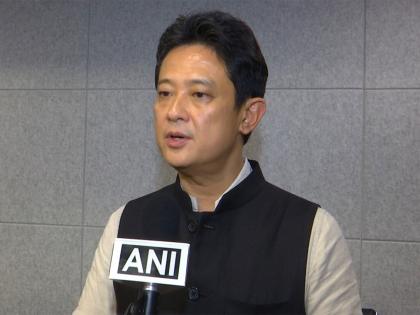South Korean diplomat bridges India-South Korea heritage through museum tour
By ANI | Updated: November 26, 2025 14:55 IST2025-11-26T14:51:13+5:302025-11-26T14:55:19+5:30
By Vanshika Saxena New Delhi [India] November 26 : At New Delhi's India Habitat Centre, the India Foundation's Katha ...

South Korean diplomat bridges India-South Korea heritage through museum tour
By Vanshika Saxena
New Delhi [India] November 26 : At New Delhi's India Habitat Centre, the India Foundation's Katha Session took a vibrant turn when Deputy Chief of Mission Sang-woo Lim of the South Korean Embassy in India led a special virtual tour of the National Museum. The event transformed into a cultural voyage, illuminating the deep-rooted civilizational ties between India and South Korea through art, myth, and shared heritage.
In an exclusive interview with ANI, Lim moved beyond conventional diplomatic discourse, blending history with storytelling to create a compelling narrative. Known for his volunteer work as a tour guide at the National Museum, he drew attention to the intertwined traditions of both nations.
"As a diplomat, I usually talk about security, trade, or international relations," Lim said, "but today, I spoke about Korea-India culture and history."
He highlighted fascinating parallels between Korea's mythical guardian spirit, Dokkaebi, and India's Kirtimukha, captivating the audience with a traditional Dokkaebi folktale. His presentation highlighted how both nations share ancient cultural philosophies rooted in Buddhism and common mythological motifs.
Lim also spoke about the Korean legend of Dangun, whose philosophy of "benefitting all humanity" echoes India's age-old concept of Vasudhaiva Kutumbakam, meaning "the world is one family." Drawing from his museum experiences, he emphasised that Korea and India's connection goes back nearly 5,000 years, a bond reinforced through cultural and philosophical exchanges across centuries.
The event was enriched by the presence of poet-diplomat Abhay K. "What I found particularly fascinating were the facts that connect India and South Korea," he said. "The parallels between India's Kirtimukha and South Korea's Tukwe, or between Pashupati and Thangun, were truly remarkable."
Abhay K further noted how the depiction of a "jovial Buddha" from Korea's ancient Paiche kingdom reflected shared aesthetic sensibilities between the two cultures. The session, blending diplomacy with storytelling, became an engaging cultural dialogue. Through artefacts, mythology, and philosophy, it celebrated how two ancient civilisations continue to inspire one another, proving that the bridge between India and Korea is not just historical, but also deeply human and timeless.
Disclaimer: This post has been auto-published from an agency feed without any modifications to the text and has not been reviewed by an editor
Open in app
